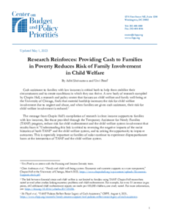Cash assistance to families with low incomes is critical both to help them stabilize their circumstances and to create conditions in which they can thrive. A new body of research compiled by Chapin Hall, a research and policy center that focuses on child welfare and family well-being at the University of Chicago, finds that material hardship increases the risk for child welfare involvement due to neglect and abuse, and when families are given cash assistance, their risk for child welfare involvement is reduced.
The message from Chapin Hall’s compilation of research is clear: income supports to families with low incomes, like those provided through the Temporary Assistance for Needy Families (TANF) program, reduce risk for child maltreatment and the child welfare system involvement that results from it. Understanding this link is critical to reversing the negative impacts of the racist histories of both TANF4 and the child welfare system, and to seizing the opportunity to improve outcomes. This is especially important as families of color continue to experience disproportionate harm at the intersection of TANF and the child welfare system.

